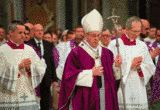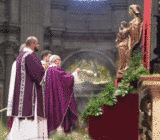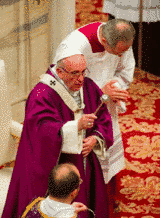Lent 2016 in the Jubilee of Mercy
Pope Francis's Message
(cf Mt 9, 13) - in Arabic, Chinese (China), Chinese (Taiwan), English, French, German, Italian, Polish, Portuguese & Spanish
“I desire mercy, and not sacrifice."
The works of mercy on the Jubilee pathway
1. Mary, icon of a Church which evangelizes because she is evangelized
In the Bull of Indiction of the Jubilee I made the invitation that “Lent in this Jubilee Year be lived more intensely as a strong moment to celebrate and experience God’s mercy” (Misericordiae Vultus, 17). With the invitation to listen to the Word of God and to participate in the “24 hours for the Lord” initiative, I wanted to emphasize the primacy of prayerful listening to the Word, especially to the prophetic word. God's mercy indeed is an announcement to the world: but each Christian is called to experience in first person this announcement. For this reason, in the season of Lent I will send out Missionaries of Mercy so as to be for everyone a concrete sign of the closeness and forgiveness of God.
Mary, after welcoming the Good News told to her by the Archangel Gabriel, prophetically sings in her Magnificat of the mercy with which God has elected her. The Virgin of Nazareth, betrothed to Joseph, thus becomes the perfect icon of the Church which evangelizes because she was and still is evangelized by the work of the Holy Spirit, who made her virginal womb fruitful. In the prophetic tradition, in its etymology, mercy is tightly linked, precisely to the maternal womb (rahamim) and to a generous, faithful and compassionate goodness (hesed) which is found within marital and parental relationships.
2. The alliance/covenant of God with men: a history of mercy
The mystery of divine mercy is revealed in the course of the history of the alliance/covenant between God and his people Israel. God shows himself always/ever rich in mercy, ready in every circumstance to pour out upon his people a visceral tenderness and compassion, above all in the most dramatic moments when infidelity breaks/ruptures the link/bond of the Pact and the alliance needs to be ratified in a more stable way in justice and in truth. We are here in front of a true and real drama of love, in which God plays the role of father and of betrayed husband, while Israel plays that of son/daughter and of unfaithful spouse. It is precisely these familial images – as in the case of Hosea (cf. Hos 1-2) – that express how far God wishes to link/bind himself to his people.
This love story culminates in the incarnation of God’s Son. In Christ, the Father pours forth his boundless mercy even to making him “mercy incarnate” (Misericordiae Vultus, 8). As a man, Jesus of Nazareth is a true son of Israel; he embodies that perfect hearing required of every Jew by the Shema, which today too is the heart of God’s covenant with Israel: “Hear, O Israel: The Lord our God is one Lord; and you shall love the Lord your God with all your heart, and with all your soul, and with all your might” (Dt 6:4-5). As the Son of God, he is the Bridegroom who does everything to win over the love of his bride, to whom he is bound by an unconditional love which becomes visible in the eternal wedding feast.
This is the very heart of the apostolic kerygma, in which divine mercy holds a central and fundamental place. It is “the beauty of the saving love of God made manifest in Jesus Christ who died and rose from the dead” (Evangelii Gaudium, 36), that first proclamation which “we must hear again and again in different ways, the one which we must announce one way or another throughout the process of catechesis, at every level and moment” (ibid., 164). Mercy “expresses God’s way of reaching out to the sinner, offering him a new chance to look at himself, convert, and believe” (Misericordiae Vultus, 21), thus restoring his relationship with him. In Jesus crucified, God shows his desire to draw near to sinners, however far they may have strayed from him. In this way he hopes to soften the hardened heart of his Bride.
3. The works of mercy
God’s mercy transforms human hearts; it enables us, through the experience of a faithful love, to become merciful in turn. In an ever new miracle, divine mercy shines forth in our lives, inspiring each of us to love our neighbour and to devote ourselves to what the Church’s tradition calls the spiritual and corporal works of mercy. These works remind us that faith finds expression in concrete everyday actions meant to help our neighbours in body and spirit: by feeding, visiting, comforting and instructing them. On such things will we be judged. For this reason, I expressed my hope that “the Christian people may reflect on the corporal and spiritual works of mercy; this will be a way to reawaken our conscience, too often grown dull in the face of poverty, and to enter more deeply into the heart of the Gospel where the poor have a special experience of God’s mercy” (ibid., 15). For in the poor, the flesh of Christ “becomes visible in the flesh of the tortured, the crushed, the scourged, the malnourished, and the exiled… to be acknowledged, touched, and cared for by us” (ibid.). It is the unprecedented and scandalous mystery of the extension in time of the suffering of the Innocent Lamb, the burning bush of gratuitous love. Before this love, we can, like Moses, take off our sandals (cf. Ex 3:5), especially when the poor are our brothers or sisters in Christ who are suffering for their faith.
In the light of this love, which is strong as death (cf. Song 8:6), the real poor are revealed as those who refuse to see themselves as such. They consider themselves rich, but they are actually the poorest of the poor. This is because they are slaves to sin, which leads them to use wealth and power not for the service of God and others, but to stifle within their hearts the profound sense that they too are only poor beggars. The greater their power and wealth, the more this blindness and deception can grow. It can even reach the point of being blind to Lazarus begging at their doorstep (cf. Lk 16:20-21). Lazarus, the poor man, is a figure of Christ, who through the poor pleads for our conversion. As such, he represents the possibility of conversion which God offers us and which we may well fail to see. Such blindness is often accompanied by the proud illusion of our own omnipotence, which reflects in a sinister way the diabolical “you will be like God” (Gen 3:5) which is the root of all sin. This illusion can likewise take social and political forms, as shown by the totalitarian systems of the twentieth century, and, in our own day, by the ideologies of monopolizing thought and technoscience, which would make God irrelevant and reduce man to raw material to be exploited. This illusion can also be seen in the sinful structures linked to a model of false development based on the idolatry of money, which leads to lack of concern for the fate of the poor on the part of wealthier individuals and societies; they close their doors, refusing even to see the poor.
For all of us, then, the season of Lent in this Jubilee Year is a favourable time to overcome our existential alienation by listening to God’s word and by practising the works of mercy. In the corporal works of mercy we touch the flesh of Christ in our brothers and sisters who need to be fed, clothed, sheltered, visited; in the spiritual works of mercy – counsel, instruction, forgiveness, admonishment and prayer – we touch more directly our own sinfulness. The corporal and spiritual works of mercy must never be separated. By touching the flesh of the crucified Jesus in the suffering, sinners can receive the gift of realizing that they too are poor and in need. By taking this path, the “proud”, the “powerful” and the “wealthy” spoken of in the Magnificat can also be embraced and undeservedly loved by the crucified Lord who died and rose for them. This love alone is the answer to that yearning for infinite happiness and love that we think we can satisfy with the idols of knowledge, power and riches. Yet the danger always remains that by a constant refusal to open the doors of their hearts to Christ who knocks on them in the poor, the proud, rich and powerful will end up condemning themselves and plunging into the eternal abyss of solitude which is Hell. The pointed words of Abraham apply to them and to all of us: “They have Moses and the prophets; let them hear them” (Lk 16:29). Such attentive listening will best prepare us to celebrate the final victory over sin and death of the Bridegroom, now risen, who desires to purify his Betrothed in expectation of his coming.
Let us not waste this season of Lent, so favourable a time for conversion! We ask this through the maternal intercession of the Virgin Mary, who, encountering the greatness of God’s mercy freely bestowed upon her, was the first to acknowledge her lowliness (cf. Lk 1:48) and to call herself the Lord’s humble servant (cf. Lk 1:38).
From the Vatican, 4 October 2015, Feast of Saint Francis of Assisi
FRANCIS
Papa Francis' Homily at Mass on Ash Wednesday
St Peter's Basilica, at which Missionaries of Mercy were sent forth
10 February 2016 - in English, French, German, Italian, Portuguese & Spanish
"The Word of God, at the start of the Lenten journey, addresses two invitations to the Church and to each of us.
The first is that of St Paul: “be reconciled to God” (2 Cor 5:20). It is not simply good fatherly advice, neither is it just a suggestion; it is a bona fide supplication on Christ’s behalf: “We beseech you on behalf of Christ, be reconciled to God” (ibid.). Why does he make such a solemn and earnest appeal? Because Christ knows how fragile and sinful we are, he knows the weakness of our heart. He immediately sees it wounded by the evil we have committed. He knows how much we need forgiveness, he knows that it is important for us to feel loved in order to do good. We cannot do it alone: this is why the Apostle does not tell us to do something but to allow ourselves to be reconciled with God, to let him forgive us, with trust, because “God is greater than our hearts” (1 Jn 3:20). He conquers sin and lifts us out of misery, if we let him. It is up to us to acknowledge that we need mercy. This is the first step on the Christian path; it entails entering through the open door which is Christ, where he, the Saviour, awaits us and offers us a new and joyful life.
There may be a few obstacles, which close the door of the heart. There is the temptation to lock the doors, or to live with our sin, minimizing it, always justifying it, thinking we are no worse than others; this, however, is how the locks of the soul are closed and we remain shut inside, prisoners of evil. Another obstacle is the shame of opening the secret door of the heart. Shame, in reality, is a good symptom, because it shows that we want to break away from evil; however, it must never be transformed into apprehension or fear. There is a third pitfall, that of distancing ourselves from the door: it happens when we hide in our misery, when we ruminate constantly, connecting it to negative things, until sinking into the darkest repositories of the soul. Then we even become kindred with the sorrow that we do not want, we become discouraged and we are weaker in the face of temptations. This happens because we bide alone with ourselves, closing ourselves off and avoiding the light; while the Lord’s grace alone frees us. Therefore let us be reconciled, let us listen to Jesus who says to those who are weary and oppressed: “Come to me” (Mt 11:28). Not to dwell within themselves, but to go to him! Comfort and peace are there.
At this celebration the Missionaries of Mercy are present, to receive the mandate to be signs and instruments of God’s forgiveness. Dear brothers, may you help to open the doors of hearts, to overcome shame, not to avoid the light. May your hands bless and lift up brothers and sisters with paternity; through you may the gaze and the hands of God rest on his children and heal them of their wounds!
There is a second invitation of God, who says, through the prophet Joel: “return to me with all your heart” (2:12). If we need to return it is because we have distanced ourselves. It is the mystery of sin: we have distanced ourselves from God, from others, from ourselves. It is not difficult to realize this: we all see how we struggle to truly trust in God, to entrust ourselves to him as Father, without fear; as it is challenging to love others, rather than thinking badly of them; how it costs us to do our true good, while we are attracted and seduced by so many material realities, which disappear and in the end leave us impoverished. Alongside this history of sin, Jesus inaugurated a history of salvation. The Gospel which opens Lent calls us to be protagonists, embracing three remedies, three medicines which heal us from sin (cf. Mt 6:1-6, 16-18).
In the first place is prayer, an expression of openness and trust in the Lord: it is the personal encounter with him, which shortens the distances created by sin. Praying means saying: “I am not self-sufficient, I need You, You are my life and my salvation”. In the second place is charity, in order to overcome our lack of involvement with regard to others. True love, in fact, is not an outward act, it is not giving something in a paternalistic way in order to assuage the conscience, but to accept those who are in need of our time, our friendship, our help. It means living to serve, overcoming the temptation to satisfy ourselves. In the third place is fasting, penance, in order to free ourselves from dependencies regarding what is passing, and to train ourselves to be more sensitive and merciful. It is an invitation to simplicity and to sharing: to take something from our table and from our assets in order to once again find the true benefit of freedom.
“Return to me” — says the Lord — “return with all your heart”: not only with a few outward deeds, but from the depths of our selves. Indeed, Jesus calls us to live prayer, charity and penance with consistency and authenticity, overcoming hypocrisy. May Lent be a beneficial time to “prune” falseness, worldliness, indifference: so as not to think that everything is fine if I am fine; so as to understand that what counts is not approval, the search for success or consensus, but the cleansing of the heart and of life; so as to find again our Christian identity, namely, the love that serves, not the selfishness that serves us. Let us embark on the journey together, as Church, by receiving Ashes — we too will become ashes — and keeping our gaze fixed on the Crucifix. He, loving us, invites us to be reconciled with God and to return to him, in order to find ourselves again."












